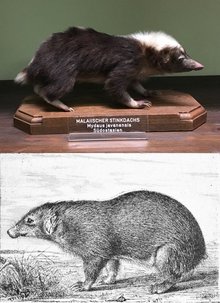| Stink badgers | |
|---|---|

| |
| Sunda stink badger (M. javanensis) and Palawan stink badger (M. marchei) | |
| Scientific classification | |
| Domain: | Eukaryota |
| Kingdom: | Animalia |
| Phylum: | Chordata |
| Class: | Mammalia |
| Order: | Carnivora |
| Family: | Mephitidae |
| Genus: | Mydaus Cuvier, 1821 |
| Type species | |
| Mydaus meliceps | |
| Species | |

| |
| Mydaus ranges | |


Stink badgers or false badgers are the species of the genus Mydaus of the skunk family of carnivorans, the Mephitidae. They resemble the better-known members of the family Mustelidae also termed 'badgers' (which are themselves a polyphyletic group). There are only two extant species – the Palawan stink badger or pantot (M. marchei), and the Sunda stink badger or teledu (M. javanensis). They live west of the Wallace Line; the Sunda species on islands of the Greater Sunda Islands, being Sumatra, Java, and Borneo; in Borneo the badger is found in Indonesia, Malaysia and Brunei. The Palawan species lives in the Philippine island of Palawan as well as the islands surrounding it.
Stink badgers are named for their resemblance to other badgers and for the foul-smelling secretions that they expel from anal glands in self-defense (which is stronger in the Sunda species).
Stink badgers were traditionally thought to be related to Eurasian badgers in the subfamily Melinae of the weasel family of carnivorans (the Mustelidae), but recent DNA analysis indicates they share a more recent common ancestor with skunks, so experts have now placed them in the skunk family (the Mephitidae, which is the sister group of a clade composed of Mustelidae and Procyonidae, with the red panda also assigned to one of the sister clades). The two existing species are different enough from each other for the Palawan stink badger to be sometimes classified in its own genus, Suillotaxus.
References
- Wozencraft, W. C. (2005). "Order Carnivora". In Wilson, D. E.; Reeder, D. M. (eds.). Mammal Species of the World: A Taxonomic and Geographic Reference (3rd ed.). Johns Hopkins University Press. pp. 622–623. ISBN 978-0-8018-8221-0. OCLC 62265494.
- Geoffroy-Saint-Hilaire, Étienne; Cuvier, Frédéric (1821). "Le télagon". Histoire naturelle des mammifères. Vol. 3 (27). Paris. pp. 1–2.
- Wilson, D. E.; Reeder, D. M., eds. (2005). Mammal Species of the World: A Taxonomic and Geographic Reference (3rd ed.). Johns Hopkins University Press. ISBN 978-0-8018-8221-0. OCLC 62265494.
- ^ Stink badgers at the Badger Pages Archived 2007-08-06 at the Wayback Machine
- Koepfli KP, Deere KA, Slater GJ, et al. (2008). "Multigene phylogeny of the Mustelidae: resolving relationships, tempo and biogeographic history of a mammalian adaptive radiation". BMC Biol. 6 (1): 4–5. doi:10.1186/1741-7007-6-10. PMC 2276185. PMID 18275614.
- Law, C. J.; Slater, G. J.; Mehta, R. S. (2018-01-01). "Lineage Diversity and Size Disparity in Musteloidea: Testing Patterns of Adaptive Radiation Using Molecular and Fossil-Based Methods". Systematic Biology. 67 (1): 127–144. doi:10.1093/sysbio/syx047. PMID 28472434.
| Genera of red pandas, raccoons, skunks, mustelids and their extinct allies | |||||||||||||||||||||||||||||||||
|---|---|---|---|---|---|---|---|---|---|---|---|---|---|---|---|---|---|---|---|---|---|---|---|---|---|---|---|---|---|---|---|---|---|
| |||||||||||||||||||||||||||||||||
| |||||||||||||||||||||||||||||||||
| Taxon identifiers | |
|---|---|
| Mydaus | |






